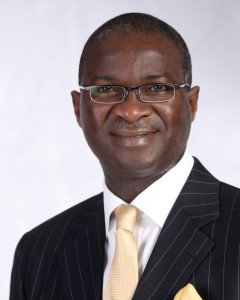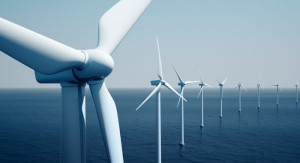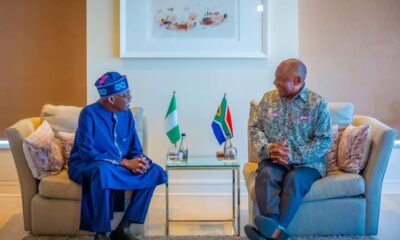Power
Fashola and the task ahead: Options before the new Power Minister

By Yemie ADEOYE
LAGOS-AFTER a protracted wait of almost six months, the Nigerian nation now have a duly constituted Federal cabinet with 36 properly screened and strategically selected ministers, it appears it’s worth the wait.
Now, there can be no excuse for the Buhari administration not to deliver on electoral promises. In a country highly yearning for direct foreign investments one of the most watched sectors has been and remains the power sector.
 Nigerians from all walks of life have expressed excitement over the appointment of the former Lagos state Governor, Mr. Babatunde Fashola, SAN as the next minister of power. The social media, especially facebook and twitter has been agog with positive expressions over the appointment of the very cerebral gentleman, even as the staff of the Power Ministry were ecstatic in jubilation at the arrival of Mr. Babatunde Raji Fashola, SAN to the Federal Secretariat.
Nigerians from all walks of life have expressed excitement over the appointment of the former Lagos state Governor, Mr. Babatunde Fashola, SAN as the next minister of power. The social media, especially facebook and twitter has been agog with positive expressions over the appointment of the very cerebral gentleman, even as the staff of the Power Ministry were ecstatic in jubilation at the arrival of Mr. Babatunde Raji Fashola, SAN to the Federal Secretariat.
However it should be noted that this was the same Ministry that has been termed as jinxed severally in the past and that also humbled the late Cicero of Esa-Oke, Chief Bola Ige when he was reported to have said he would turn the sector around. The rest of that story is today, history.
Just as Mr. Fashola is being appointed as the next power Minister, Egbin the nation’s largest thermal power station has dropped from its 1320mw capacity to 660 Mw, this is coming just as the nation’s power sector has a combined generation output of about 4000Mw for a nation of 170 million people.
In a telephone chat conducted by Biztellers.com with some operators and players in the power sector it was gathered that one of the fastest ways to ensure that the sector lives up to expectation is for the incoming minister to take some drastic measures in ensuring the immediate licensing of embedded power plants across the country as this would ensure that the national grid is freed of a lot of dependents currently tied to it.
It is believed that the DISCOS have not made any infrastructural contribution to the assets they have inherited from the PHCN and as such we are still under the whims and caprices of PHCN. Simply put the masses are not benefitting from the so-called deregulation of the sector.
It is important to note that until Nigerians are able to buy power from any company of their choice and also port from one power service provider to another then it is not yet uhuru with this most important sector for economic development. In developed climes, a single estate can be powered by several power suppliers to each apartment. Specifically apartment ‘A’ can be supplied by a particular energy company while apartment ‘B’ is supplied by another, and these apartments reserve the right to discontinue the service whenever they so desire. That is what the new power minister should set out to do via strategic policy formulation and implementation. Below are the quick wins for Mr. Fashola as shown by a detailed research over the years.
EMBEDED POWER PLANTS: The Nigerian Electricity Regulatory Commission (NERC) during a recent meeting with members of the Manufacturers Association of Nigeria (MAN) had called on the association to drive its plan to grow investments in embedded and captive electricity generation in Nigeria. NERC, during the meeting said that it would welcome a partnership with the association to develop embedded power generation in industrial clusters around the country. Both parties however agreed on the need to create a framework for the creation of micro grid for industrial clusters across the country, as well as driving same with a special purpose vehicle (SPV) that could be created by MAN. Both team in this regard decided to set up a committee that would understudy and address possible challenges posed to industrial productivity and the country’s broader economic goals as it relates to power.
The committee will also plan how to develop and dedicate small grids that can be connected to a large distribution grid to service industrial clusters. Sam Amadi, chairman of NERC, disclosed at the meeting that the Commission had briefed Professor Yemi Osinbajo, vice president, on the objective of the meeting, which is to make power available to industrial clusters in a reliable and quickest possible approach.
He noted that amongst the options that are being considered is an arrangement to upgrade licenses of captive electricity generators with excess capacities to supply firms within their vicinity through commercial arrangements that would be jointly beneficial to the electricity distribution companies and the industries. Amadi equally stated that MAN could take up the option of developing small embedded power plants using the huge coal deposits that are found across Nigeria.
According to him, investments in such small size coal-powered plants could be quite economical for MAN to promote especially amongst its members in industrial clusters with good coal deposits. He further explained that the establishment of micro grid could be, “beneficial as it will provide commercially viable electricity to industries and free grid electricity that goes to industries for residential and other consumers.” The meeting also revealed that a technical committee with nominations from the Commission will be set up and coordinated by MAN since its members will be the main beneficiaries of stable and adequate electricity supply. The incoming Minister of Power needs to sit down with NERC and take an intricate look at this report with a view to ensuring the quick implementation of the recommendations.
SOLAR: If the incoming minister must leave an indelible mark in the nation’s power sector, it is highly imperative for him to commence almost immediately a massive licensing of photovoltaic/ solar energy operators.
Solar is the cheapest and fastest means to constant power supply, and for a country as Nigeria which is in dire need of infrastructural development which in turn woos prospective investments, it is important to immediately formulate a policy that would aid the massive influx of solar energy operators into the country.
Such policies may also include laws that would make it mandatory for every new building to have a solar-paneled roof from the point of architectural approval. This is already a practice in some countries of the world and it has formed a major stop-gap for the power sector in such countries.
South Africa with a population of about 52 million people generates about 38,000 Mw and the country has plans to get a minimum of 18,000 Mw from solar energy by 2020. Already more than Nigeria’s current 4,000 Mw output capacity is being generated via solar energy in South Africa, they aren’t satisfied with that and are planning to boost that capacity as stated above.
COAL: The enormity of untapped coal in Nigeria is frightening, the federal government recently put the figure at about 2.8 billion metric tonnes, and the minister would need to bring fresh ideas in this regard, away from the conventional thermal and hydro fired power stations. Almost 90 percent of South Africa’s 37,000 Mw output capacity is generated from coal. Now the minister needs to see this as a must do if he must live up to the huge expectations of Nigerians in this make or mar sector. Biztellers can authoritatively confirm that with a determined political will and a quest to leave behind a legacy for generations yet unborn the federal government of Nigeria can generate no less than 20,000 Mw from coal alone, and this is where the current Minister is highly expected to make policy pronouncements and follow it up with detailed implementation.
WINDMILL: With the aquatic splendor of cities like Lagos, Portharcourt, Warri, Calabar, Uyo, Ondo, Bakkassi etc Nigeria should use the coastal regions to generate power as a matter of urgency. A case study for this technology is the Netherlands.
Windpower in the Netherlands is recently been used as a renewable energy source. As at December 2013, 1,975 wind turbines were already operational on land in the Netherlands, with an aggregate capacity of 2,479 MW.
An additional 228 MW of capacity was installed at sea in Amsterdam. The Dutch are trying to meet the EU-set target of producing 14 percent of total electricity from renewable sources by 2020. Windmills have historically played a major part in the Netherlands by providing an alternative to water driven mills.
This is important for Minister Fashola especially in this era of change. All the above mentioned strategy is not rocket science and only requires the willpower to implement.
A diversified power generation is most essential at this time in Nigeria, while the conventional hydro and thermal power plants including the NIPP’s should continue to receive immense funding for maintenance and increase in capacity.
Power
Nigeria To Face Increase In Electricity Tariffs From July
According to reports, Nigeria’s population may face more challenging times ahead as electricity tariffs are projected to increase by over 40 percent in the near future.
This rise in tariffs could ultimately result in the elimination of all energy subsidies in the country.
Currently, the electricity sector relies on a monthly subsidy of approximately N50 billion, stemming from a shortfall in revenue.
The tariff hike, scheduled to take effect from July 1, will pose another significant test for President Bola Ahmed Tinubu’s administration and its ongoing market reforms.
The government has already taken steps to remove subsidies on Premium Motor Spirit (PMS) and implemented a floating exchange rate for the national currency.
These decisions have added complexity to the price-setting process of the Nigerian Electricity Regulatory Commission (NERC) and its 2022 Multi-Year Tariff Order (MYTO).
Despite power sector players failing to meet the target of supplying a minimum of 5,000 megawatts, even after signing contracts with the Nigerian Electricity Regulatory Commission (NERC), the current Service Based Tariff (SBT) is based on an exchange rate of N441/$ and an inflation rate of 16.97 percent.
According to NERC’s directives in 2015, the average tariff for distribution companies (DisCos) and different categories of end-users was N25 per kilowatt, as per Order 198/2020, which came into effect on September 1, 2020.
However, in the MYTO for 2022, the average tariff increased to N60 per kilowatt across all customer categories, and in the most recent update, it stands at N64 per kilowatt.
The determination of the 2015 tariff relied on a foreign exchange rate of N198.97/$, which increased to N383.80/$ in 2020 and further to N441.78/$ in 2022. In terms of inflation, the 2015 MYTO utilized an 8.3 percent rate, which rose to 12 percent in 2020 and reached 16.97 percent in 2022.
Currently, the inflation rate stands at 22.41 percent, and experts predict it could reach 30 percent by the end of June, considering the floating of the naira and the removal of subsidies on Premium Motor Spirit (PMS).
The tariff determination process takes into account various factors, including the significant metering gap of over seven million, gas prices, losses within the system, and the actual generation capacity. These elements play a role in determining the final tariff.
As anticipated, NERC had projected that the tariff for July 2023 would eliminate subsidies and introduce increases to the previously frozen tariff bands D and E.
These adjustments were intended to raise the bands from N54.59/kilowatt to N62.16 for band D and from N48.37/kilowatt to N61.16 on average. Moreover, the average increase across all bands was expected to reach N67/kilowatt.
However, due to the ongoing floating of the naira and the significant inflationary pressures, it is now projected that the new average tariff will need to be approximately N88/kilowatt for the power sector to recover its costs.
According to energy lawyer Madaki Ameh, the continuous and frequent increases in power tariffs are akin to a form of blackmail against electricity consumers.
Amen said “Indexing the cost of electricity on the dollar is a huge mistake because most of the inputs for electricity supply are local. The DisCos are also holding Nigerians to ransom by failing to increase the supply base, thereby spreading the tariffs across a broader spectrum of consumers to reduce the unit cost of electricity.”
He insisted that as long as there remain many unmetered consumers and many others not connected to the grid at all, the few consumers on the grid would continue to be subjected to unjust tariffs, which are not reflective of the quality of service delivered.
Ameh hoped that the signing into law of the new Electricity Act would mark “the beginning of light at the end of the long tunnel of inefficient and epileptic power supply in Nigeria.”
Segun Ajibola, the former President of the Chartered Institute of Bankers of Nigeria (CIBN) and a professor of Economics at Babcock University, highlighted that there remains a gap between the cost of electricity and the value it provides in exchange.
“Nigerians are still struggling to keep pace with the cost of energy for business and household use. If the electricity tariff goes up as envisaged, the question remains if there will be value for the quantum of electricity so paid for.
“The truth remains that if electricity supply is constant, of the right quantity and quality, the envisaged upward review in the tariff will be gladly absorbed by the populace,” he said.
Lanre Elatuyi, an Electricity Market Analyst, expressed that the recently implemented tariff rate would have significant implications. He emphasized that the devaluation of the Nigerian currency poses a major challenge for companies with dollar-denominated loans to repay.
He said “They will need more naira today to buy a dollar. They need to manage their exposure to foreign exchange risk. Even operators of hydro plants pay their concession fees in dollars. So, wholesale electricity price will be adjusted upward and this will get to the end users’ tariffs too.”
Power
Buhari’s Gov, State Governors Secretly Sold 5 Power Plants – Shehu Sani

Senator Shehu Sani, a prominent Nigerian lawmaker has accused President Muhammadu Buhari’s government and state governors of secretly selling five power generating plants without disclosing the utilization of the funds received.
He disclosed this in his Twitter handle on Monday.
Senator Sani, known for his outspoken nature and activism expresses his concerns over the alleged undisclosed sale of the power plants.
He claimed that the government, in collaboration with state governors, had carried out the transactions without informing the Nigerian public about the purpose of the funds acquired from the sale.
The post reads “Buhari’s Government in collaboration with the State Governors quietly sold the five power generating plants without telling the country what the money was used for.
Power
Nigeria’s VP Inaugurates 240MW Afam 3 Fast Power Project

The Vice President of Nigeria, Prof. Yemi Osinbajo, has inaugurated the Afam 3 Fast Power 240-megawatt turbine project in Rivers State.
The project, which is a subsidiary of the Transcorp Group located in Oyigbo, on the outskirts of Port Harcourt in the state, was unveiled during a ceremony that took place on Tuesday.
The event, which was attended by several dignitaries, including the Chairman of Transcorp Group, Tony Elumelu, and other top officials, saw the Vice President arriving at the venue in a chopper at exactly 11:35 am.
Upon his arrival, he was escorted into the premises where he officially inaugurated the project.
During his speech at the event, he disclosed that the acquisition of the project was approved by the National Council on Privatisation (NCP) and the acquisition cost was ₦105.3 trillion.
Osinbajo further emphasized that the successful completion of the project is a significant breakthrough in Nigeria’s power sector.
In his address, Osinbajo said, “In 2020, electricity subsidies reached N584 billion, but service-based tariffs have led to a doubling of collection in the Nigeria Electricity Supply Industry from N40 billion in 2020 to N80 billion in the first quarter of 2023.
“If this trajectory continues, the Nigeria Electricity Supply Industry will be able to pay for itself. Our administration has also created programs for off-grid for electrification. Rural Electrification Agency now has the capacity to provide electricity supply on a first-class basis.
“We are on track to electrify all Nigerians in the next decade. However, we will not make progress if our gas supply does not improve. The gas supply challenges are hampering improvements.”
He further lauded General Electric, the National Council on Privatization (NCP), and the host communities for their contribution to the completion of the Afam 3 Fast Power 240-megawatt turbine project in Rivers State.
Osinbajo highlighted that the successful completion of the project will significantly increase the country’s power supply capacity, leading to a better quality of life for Nigerians.
In November 2020, the federal government and the Transcorp Power Consortium signed a share sale and purchase agreement in relation to Afam Power Plc and Afam 3 Fast Power Limited.
The National Council on Privatization approved the privatization of the Afam Power Plant back in August 2017, which triggered a competitive bidding process involving 12 prospective investors.
After careful consideration, Transcorp Power Consortium emerged as the preferred bidder with a combined offer of N105 billion.


















